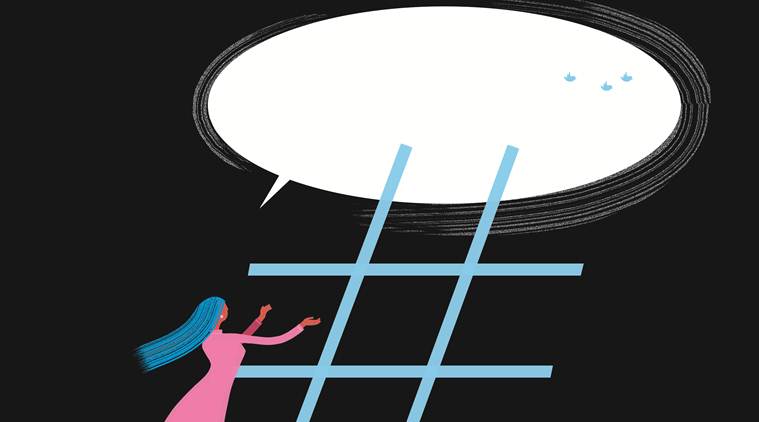A Moment Of Rupture
Women are speaking and they are angry. There’s a new language of dissent.
Written by Paromita Chakrabarti | Published: October 22, 2018 12:05:33 am
 The rules of social engagement have changed in new India. What hasn’t is the deeply entrenched sexism in our cultural fabric that refuses to recognise consent as a wide-ranging arc and women as equal partakers in it. (Illustration: CR Sasikumar)
The rules of social engagement have changed in new India. What hasn’t is the deeply entrenched sexism in our cultural fabric that refuses to recognise consent as a wide-ranging arc and women as equal partakers in it. (Illustration: CR Sasikumar)In the weeks since the #MeToo survivor accounts surfaced on social media calling out men in powerful positions in the media and the entertainment industry for their sexual misconduct and breach of trust, most conversations with friends and female colleagues have been about how triggering the accounts of these incidents have been for all of us. Like most migrant first or second-generation workers in cities that we have come to embrace as home, each of us has experiences that we wish were never our burden to bear.
These experiences, however, make for excellent cautionary tales — the deep dark wood and the ogre that you must avoid; except, far too often, the ogre proves to be a wily adversary. He comes not in the guise of a stranger, but as a mentor; a boss; a friend you trust; a co-worker who you get along fabulously with; a man you interviewed; a man with a legacy. A man who could, with a gesture or an act, reduce your self-worth to nought.
The rules of social engagement have changed in new India. What hasn’t is the deeply entrenched sexism in our cultural fabric that refuses to recognise consent as a wide-ranging arc and women as equal partakers in it. For that would require, as a basic premise, a recognition of the other as an adult whose language of desire, agency and comfort needs to be engaged with, negotiated and respected. Our post-liberal approach to the interaction between the sexes is still shackled by outdated moral codes, where even woke men view gender as a power project: Women either need to be rescued — “beti bachao” — or fit into slots that make it easier for men to reduce them into types.
Yet, this time, women are refusing to toe the line. In the year since The New York Times’s investigation outed Harvey Weinstein as a sexual predator, and, an Indian law student published a crowd-sourced list of academics accused of sexual misconduct, a dam seems to have burst, taking with it the onus to suffer alone, and, in silence. For far too long, the joke’s been on women. For far too long, they have, like Hannah Gadsby in Nanette, identified as tired.
Women are finally speaking up and they are angry. Their language of dissent is still formulating, still being shaped by the scars they bear, sharpened by fury, shame or revulsion, but they are no longer afraid. For far too long, they have been told how to live their lives. They have been told to adjust, ignore, compromise — at home, in public spaces and at workplaces. They have been told by leaders that “boys will be boys” so the onus of their safety is on them. What sort of work entails hours so disruptive? A drink with a colleague; an office party after work? Was the skirt too short, the smile too inviting? They have been put in their place in the name of power, politics, she-meant-yes-even-though-she-said-no, or, hey-she-asked-for-it; sometimes, for ambition or inexperience. Actually, they have been put in their place for you-name-it-and-for-it.
A new sisterhood is squaring up to the challenges of the bro culture and asking for accountability. They are holding each other’s hands and telling themselves: “We have been there, too. We believe.”
A sisterhood can achieve unusual things. It can take on a (former) minister or a woke artist, a celebrated filmmaker or an actor accused of being complicit in the sexual assault of a female colleague. To know that there are others behind you ready to take up the baton should you falter or be browbeaten by the unequal power dynamics is a gift made possible by the struggles of women who have preceded us at the workplace without the safety valve of the Vishakha guidelines, an ICC, or hope of redressal.
It is now time to extend this solidarity and embrace women outside urban workplaces, in smaller cities and unorganised sectors, where the quantum of exploitation is far more severe and the mechanism of redressal almost non-existent. For this, now, is our moment of rupture, our hour of reckoning — “our country moving closer to its own truth and dread”.
paromita.chakrabarti@expressindia.com
- TAGS:
- MeToo
- Sexual Harassment
For all the latest Opinion News, download Indian Express App
More From Paromita Chakrabarti
- By the Book: The Age of AngerThis week, books taking on patriarchy. In these dark times, how does one teach a future generation about rules of engagement and give them tools…
- Female desire takes the power equation out of patriarchy’s hands: Anita NairWriter Anita Nair, 52, on her new novel, writing about male entitlement and why a woman’s quest for identity will continue to be challenged...
- By the Book: War, What is It Good For?This week, books on the ravages of war - from 'I Believe in Unicorns' and 'No Guns At My Son’s Funeral' to 'Dear World: A…








































No hay comentarios:
Publicar un comentario